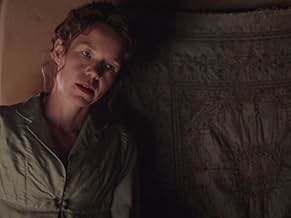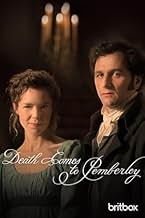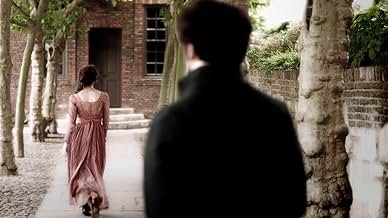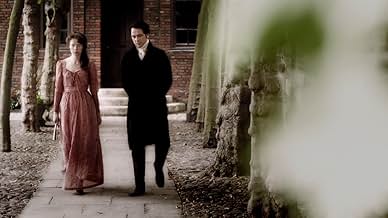Daniel Peacock's adaptation of P. D. James' reworking of PRIDE AND PREJUDICE offers a fascinating combination of styles and stylistics. It unfolds in the leisurely manner of most British television detective thrillers, taking care to sketch in the characters and define their relationship to one another. A murder occurs two-thirds of the way through the first episode, and the remainder of the time is spent outlining the series of hypotheses, assumptions (some mistaken), and clues that lead to the unmaking of the culprit. DEATH COMES TO PEMBERLEY also situates itself squarely in the heritage adaptation genre, with plenty of exterior shots of the Darcys' house (I counted twelve in episode one alone), augmented with moments of period 'realism' as various types of coach and horse arrive and depart from the front entrance. The cast comprises a series of star names calculated to appeal to different generations of television viewers; Jenna Coleman from EMMERDALE and DOCTOR WHO shares the screen with Trevor Eve (WAKING THE DEAD, SHOESTRING) and Penelope Keith (THE GOOD LIFE, TO THE MANOR BORN). The acting is competent without being out of the ordinary, although I do wonder whether the Lydia Bennet of Austen and James would have reacted with quite such ferocity to her husband's arrest. What gives this production is true fascination, however, is the way in which director Peacock deliberately references Simon Langton's PRIDE AND PREJUDICE (1995) throughout the mise-en-scene. This can be seen in the costume- designs (by Marianne Agertoft), as well as in the characterization: Elizabeth Bennet (Anna Maxwell Martin) communicates the same spirit of quiet determination embodied by Jennifer Ehle in the earlier production. She is also shot in much the same way, with the emphasis placed on her reactions to what happens around her. Her mother (Rebecca Front) seems completely oblivious to her offspring's feelings and shrilly complains of having had a fit should anything go wrong, in a performance inspired by Alison Steadman's reading in the earlier revival. Likewise her husband; James Fleet follows Benjamin Whitrow in maintaining a facade of polite loyalty to Mrs. Bennet, while searching for any opportunity to escape. The experience of watching DEATH COMES TO PEMBERLEY is a fascinating one, an exercise in identifying intertexts as well as understanding how adaptations are shaped as much by other adaptations as by their source-texts. Definitely worth watching.






































